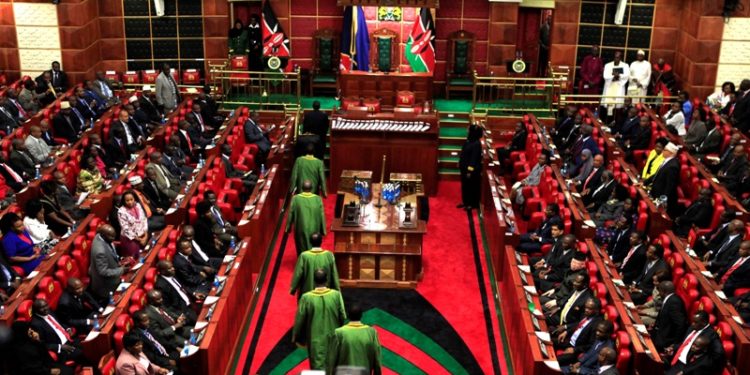The resumption of parliamentary sessions in Kenya has sparked intense debate following recent Cabinet reshuffles by President William Ruto.
The controversy deepened when Speaker Moses Wetangula’s announcement to the National Assembly presented the list prompting widespread scrutiny and discussion among lawmakers and the public.
At the heart of the controversy is the dismissal and reassignment of several Cabinet Secretaries, a move that has elicited varied reactions across the political spectrum.
Dr. James Nyikal, Member of Parliament for Seme, highlighted the pivotal role of public opinion in these changes. He asserted, “The Cabinet Secretaries were dismissed due to public pressure, clearly indicating that the public had lost confidence in the government. Therefore, the process of reversing this decision must be conducted with utmost transparency. What the President announced is markedly different from what you have read to us.”
Adding to the discourse, Kassait Kamket offered a nuanced perspective: “While we must maintain high standards for Cabinet appointees and other public officials, it’s unrealistic to expect the President to appoint flawless individuals. Even as some members, like Hon. Junet, threaten the nominees, they should remember that those who seek equity must come with clean hands. No one should jeopardize other Kenyans’ careers while presenting themselves as beyond reproach.”
A notable figure in the reshuffle, Aden Duale, who was reassigned from the Ministry of Defence to the Ministry of Environment, Climate Change, and Forestry, shared his thoughts on social media. In a tweet, Duale expressed gratitude: “I am thankful to President William Ruto for reassigning me from the Defence Ministry to the Ministry of Environment, Climate Change, and Forestry. I am eager to serve in my new role, focusing on sustainable environmental management, combating climate change, and promoting reforestation and conservation efforts.”
Duale’s statement took on a spiritual dimension as he quoted the Quran: “Indeed, ‘And it may be that you dislike a thing which is good for you and that you like a thing which is bad for you. Allah knows, but you do not know.’ – Quran 2:216.” This reference suggested a deeper, faith-based acceptance of the changes in his career.
The integrity of the parliamentary process came under scrutiny when MP Esther Passaris raised alarming concerns about alleged bribery attempts. She stated, “When an MP publicly claims he was offered Kes 2 million to vote YES and declined, it casts doubt on parliamentarians’ ability to make independent decisions.”
Passaris called for a thorough investigation, saying, “We don’t want him to retract his statement. He should prove who offered him 2 million. If he lied, he should face consequences, as his claim implicates every member of Parliament.”













